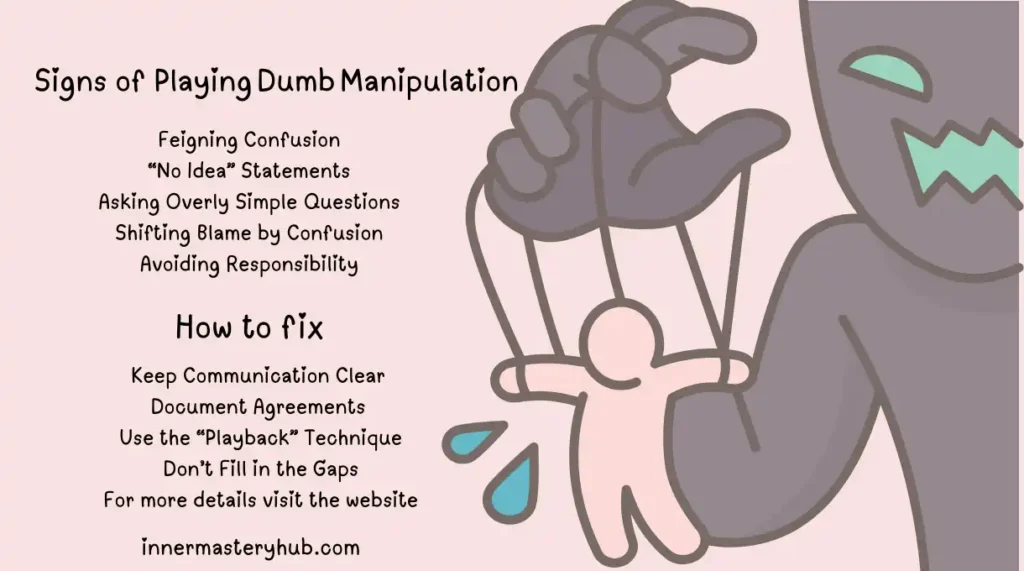13 Playing Dumb Manipulation Tricks: Signs You’re Being Played
Playing dumb manipulation tricks
Playing dumb manipulation tricks describes a behavior in which someone pretends to be unaware to avoid responsibility or gain an advantage. This snippet explains the signs, psychology, and impact of such tactics, helping readers recognize them early and respond calmly, confidently, and with clear boundaries.

Many people don’t notice that playing dumb is a sneaky yet bad behavior. When someone says “I didn’t know” or “You never told me,” they are acting as if they do not know something, looking confused, or avoiding Responsibility. Sometimes this behavior isn’t innocent. In many scenarios, it’s a way to shift the blame and avoid responsibility.
If someone consistently engages in manipulative behavior, it can cause tension, Confusion, and problems in relationships. You can feel like you’re continually saying the same thing, working harder, or not trusting your memory. In the long run, this can make you angry and tired.
At first, most people don’t notice these signs. The person who is playing dumb manipulation tricks seems innocent. But repeated patterns show the truth: this isn’t about not comprehending. It’s about having power.
Why People Play Dumb Manipulation Tricks
Playing dumb manipulation means claiming not to know something to avoid responsibilities, tasks, or the truth. This method is used when someone seems unaware, perplexed, or confused about what happened.
Emotional manipulation means faking to be unaware, avoiding Guilt, and making someone doubt their memory or judgment. The status quo will not change. Trust loss. Tired, lonely, and self-conscious. Cooperative work and care are one-sided. Fighting misunderstandings is exhausting.
13 Signs someone is Playing Dumb Manipulation tricks with you
1. Feigning Confusion
The person acts like they don’t understand something, but you know they do. It’s not real Confusion. It’s like acting as if you’re lost, so you don’t have to do something or take Responsibility. For example, when you ask them to do something they’ve done before, and they argue, “Wait, how can I do that again?” even if they’ve done it many times before.
In everyday life, a coworker avoids writing a report by acting that way, saying, “What exactly is unclear?” This gently questions the behavior and requires more information.
2. Insisting on Innocence
Despite evidence, the person denies Guilt. Denial with a “harmless” face, they claim, “I would never do that!” while you have proof. This impacts emotions and trust.
A friend tells a rumor and then says, “I didn’t say anything bad.”
Respond with facts. “You said X, and Y sent it.” That keeps the talk real.
3. Denial or “No Idea” Statements
The person says “I don’t know,” “I have no idea,” or “That wasn’t me” to awkward situations. Even when present or taking part, these phrases shield.
In daily life, “Why didn’t you pay the bill?” They say, “What bill?”
How to reply: Record important data. Remove excuses with written reminders or shared calendars.
4. Asking Overly Simple Questions
This happens when someone asks questions they already know to get you to give up or take over. You take on the mental load.
“Where’s the broom?” When it’s been there for years.
Redirect. Where do we keep it usually? A reminder that they know the solution.
5. Shifting Blame by Confusion
They claim your explanation or tone was imprecise to deflect blame. They may say, “You didn’t explain it right,” when they won’t follow through.
Daily life. You outline a plan, and they say, “You didn’t say that.”
How to reply: “What part didn’t make sense?” Offer to clarify in writing next time.
6. Acting as a Victim of Misunderstanding
They claim, “You misunderstood me,” even if their actions or words were plain. This burdens you emotionally.
People say, “You took it the wrong way.”
Respond: Stand firm. “This was the impression. Let’s clarify to avoid repeating.”

7. Avoiding Responsibility
They regularly “forget” things. They promise but don’t deliver, then say they forgot.
Daily life: They neglect duties.
How to reply: Track tasks or write agreements. “Let’s write this down so we both remember.”
8. Selective Memory
Only beneficial elements of the story are remembered. This helps them appear innocent and unsettling.
In daily life, they remember agreeing to a plan’s fun but not its work.
Notes or messages. Say, “We agreed on both parts. This is the message.”
9. Using Confusion to Avoid Guilt
They claim ignorance of your unhappiness. It eliminates the need to apologize.
In daily life, they joke harshly and add, “I didn’t know that would hurt you.”
Respond: Clarify your feelings. I felt degraded. Please avoid next time.”
10. Escalating to Absurd Misunderstanding
Overinterpreting or seeming to misunderstand derails conversations. It avoids unpleasant truths.
In daily life, you say, “Let’s talk about your attitude,” and they ask, “What do you mean by attitude? Gravity?”
How to reply: Stay on topic. “Let’s stay with the actual issue.”
11. Combining Charm with Confusion
They congratulate you or appear pleasant, then act confused or “innocent” when they breach a line. Disarm your reaction with the charm.
In daily life, they flirt, then deny meaning it.
Response: Be direct. “I felt awkward about that comment. Keep boundaries clear.”
12. Emotional Withdrawal Masked as Confusion
They withdraw emotionally and say they didn’t understand or know how to respond.
Daily: You open yourself emotionally, and they reply, “I didn’t know you needed support.”
Answer: Clarify expectations. “When I share something important, please listen or ask how you can help.”
13. Overloaded with Questions to Appear Ignorant
They ask a lot of unnecessary questions or ones that have already been asked to buy time or avoid taking accountability. This makes you feel like the teacher instead of a colleague or teammate.
In everyday life, when you ask them to plan something, they give you simple questions that they could answer on their own.
How to answer: You can figure these things out. Let’s share the work equally.
How to Protect Yourself from Playing Dumb Manipulation
The first step is accepting that playing dumb is a form of manipulation. However, figuring out how to respond will help keep your time, energy, and peace of mind intact. You don’t have to fight, insult, or fix the other person. Rather, you need clear skills to help you stay calm, focused, and in charge.
Here are some ways to protect yourself:
1. Keep Communication Clear and Simple
Here are some useful techniques to keep yourself safe:
- Make sure your communication is clear and simple.
Speak clearly and briefly. Don’t give extensive explanations. If someone says they don’t comprehend a lot, break it down into steps:
- “We agreed on this.”
- “You said you’d do it.”
- “The deadline is Friday.”
This can limit Confusion and give them less room to twist your words.
2. Write down requests and agreements
When you can, write things down; you can keep a record in texts, emails, or even by sharing lists. People can be asked to repeat what they said if they later forget or deny it.
Instead of asking in a friendly way, “Can you take care of the meeting notes?” write:
“Just confirming, you’re handling the notes for today’s meeting.”
3. Set Boundaries Around Repetition
If you keep getting the same questions or excuses, set a limit.
Say:
“I’ve already explained this. I need you to take it from here.”
Or:
“Let’s avoid going in circles. What’s your plan?”
This shifts the Responsibility back to them, where it belongs.
4. Use the “Playback” Technique
Repeat their words back to them when they act confused or deny something.
Example:
“Last night, you said you’d call the plumber. Do you remember saying that?”
This keeps the focus on their actions, not your emotions.
5. Don’t Fill in the Gaps for Them
If they say, “I don’t know what to do,” don’t jump in with the solution every time. Ask questions that make them think.
Try:
“What do you think the next step is?”
“What have we done in the past?”
This breaks the habit of you doing the mental work for them.
6. Hold People to Their Patterns, Not Just Their Words
Pay attention to actions that occur repeatedly. It’s normal for people to get confused once in a while. A pattern of avoiding, forgetting, or denying suggests something else.
Tip
Say, “This has happened a few times. Let’s figure out how to avoid it going forward.”
That calls out the behavior without blame.
7. Stay Calm and Don’t Get Pulled into Drama
People who manipulate typically use emotional responses to get people to pay attention. If you get angry, they can say, “You’re overreacting.”
Solution
Stay neutral and stick to facts. Focus on the issue, not the tone.
8. Use Deadlines and Follow-Ups
If someone often delays or forgets, set deadlines and follow up.
Say:
“Please finish this by 3 PM.”
“Just checking in, were you able to do what we discussed?”
It reduces the space for manipulation.
9. Trust What You Know
If anything seems wrong, it probably is. You don’t need confirmation for every gut sensation you have. Playing dumb, manipulative games might make you doubt what you remember or how you think. Stay true to what you saw, heard, or did.
Tip
Write short notes for yourself after key conversations. That helps you stay clear.
10. Decide When to Walk Away
You may need to distance yourself from the individual if the conduct doesn’t stop, even if you set explicit rules and talk to them about it. This is especially true in intimate relationships. Manipulating people all the time is hard on your emotions.
Reminder
You don’t have to fix someone who keeps acting like they did not understand you. You are responsible for keeping yourself safe.
What Is Playing Dumb Manipulation and Why It Matters
Many people are unaware that playing dumb manipulation is a hidden yet destructive activity. People do this when they act like they don’t know something, look confused, or say “I didn’t know” or “You never told me” to avoid providing ownership. This kind of activity isn’t always benign. It’s often a way to change the subject, put off work, or avoid taking Responsibility.
Playing mind manipulation can cause tension, uncertainty, and problems in relationships when someone does it frequently. You can feel like you’re always saying the same thing, doing more work, or not trusting your recall. This can lead to feelings of anger and fatigue over time.
At first, most people don’t see these signals. The person who is manipulating you could seem innocuous, disorganized, or merely forgetful. But repeated patterns show the truth: this isn’t about not comprehending. It’s all about control.
What Is Playing Dumb Manipulation Tricks and Why You Should Pay Attention
Playing dumb manipulation involves intentionally failing to understand what’s happening. They appear puzzled, forget things, or ask simple questions they already know the answer to. It looks like a mistake, but it’s generally a purposeful attempt to dodge Responsibility, delay action, or shift blame.
Playing dumb manipulation helps people maintain control without appearing aggressive. This behavior produces long-term issues. You may need to repeat yourself, take their place, or doubt your memory. It saps time, energy, and patience.
Playing dumb manipulation isn’t always clear. It usually lurks beneath a smile, shrug, or “I didn’t know.” This makes it easy to overlook, especially in close relationships or trusting workplaces. Once you understand the patterns, it will become clearer.
Learn how to spot foolish manipulation in this post. Simple examples and practical ideas help you respond to each sign. Learning this behavior is the first step toward setting boundaries, conserving energy, and managing time effectively.
Final Takeaway
Playing dumb manipulation works because it’s sneaky, quiet, and easy to excuse. But once you spot it, you gain the power to stop it from taking over your time, energy, and peace. Clear words and boundaries, with confidence in yourself, are your best tools against people who play dumb manipulation tricks..
FAQs about Playing Dumb Manipulation
Why do people play dumb manipulation tricks?
Some play dumb to deflect Responsibility, lower others’ guard, or get information. It can protect manipulators from blame or help them guide situations to their advantage.
How to spot when a person plays dumb manipulation tricks?
Watch for repeated “I don’t recall,” vague answers, or innocent Confusion in serious moments. These may signal purposeful evasion rather than genuine forgetfulness.
Is playing dumb manipulation the same as gaslighting?
Not exactly. Gaslighting alters your perception of reality. Playing dumb feigns ignorance. But both undermine your confidence and distort the truth.
How to respond when someone plays dumb manipulation tricks?
You can calmly restate specifics, ask precise questions, or request clarity, without aggression, to hold them accountable.
What vulnerabilities does play dumb manipulation tricks exploit?
It targets those who avoid conflict, doubt their judgment, or seek harmony, making them more susceptible to manipulation.
How to outsmart a manipulator?
Stay calm and slow things down. Don’t argue feelings, ask for clear facts and specifics. Set firm boundaries and consequences. Keep communication brief and written when possible. Don’t overshare. Verify claims with others. Trust patterns, not apologies. If needed, limit contact and get support.
What is the power of playing dumb manipulation?
Playing dumb manipulation tactic where someone pretends not to understand to avoid responsibility, delay decisions, extract extra help, or make others doubt themselves. It shifts effort onto others, reduces accountability, and can quietly control outcomes without open confrontation.






